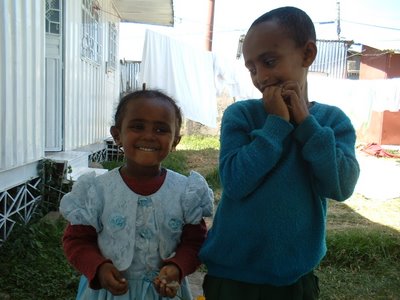 Awakening: Ambiguity Fosters Clarity
Awakening: Ambiguity Fosters Clarityby: Nasir Al-Amin
Ethiopia was a moment of awakening. It brought the numbers to life; the figures (4.6 million orphans, and 200,000 children living on the streets of Addis) became tangible. The words (domestic workers, poverty, commercial sex workers, child labourers, orphans, under-five mortality rate, and beggars) were now faces, individuals that I built relationships with, people I ate and laughed with, people I hugged and lent a shoulder to in moments of sorrow. In essence, my reality had changed. My perspective and/or worldview was altered by the realty of others. The children and their families became the center. My life, rather my life’s purpose was no longer about me. And it was this shift that nurtured a dormant seed of discontent that subsequently, led to a year of isolation, self-reflection and reprioritization.
After I returned to the States, for the first few months I isolated myself (at first unknowingly) from friends (especially my Ethiopian friends) and environments (Ethiopian restaurants and cafés) that at best reminded me of Ethiopia and at worst subjected me to that dreaded question: “How was Ethiopia?” As Ethiopia was no longer this tranquil place, an escape from America’s dominant culture and norms, a bastion of generosity and love, my on little gem, this utopia that the West had not conquered or found. Ethiopia (both figuratively and literally) in all it splendor had changed and I could no longer articulate this new reality. My life experiences, Columbia diction and education could not prepare me for the emotional component of my endeavor. The veil had been removed, and what I saw left me speechless.
What words can speak to the reality of desperate girls walking the streets at night selling their bodies, or a teenage mother and her baby after a day of begging trying to sleep and stay warm on the sidewalk wrapped in tattered and soiled blankets—shockingly, often one sees groups of street children huddled together employing body heat as their sole means of staying warm. How does one express that somber feeling when children run to your vehicle at traffic lights placing their hands and faces on the car window with a dismal gaze begging for food or coins?
Unfortunately, for some Ethiopians living abroad and in Ethiopia, this reality has become normalized and thus they have become desensitized to the destitute and their plight. So much so that when they speak of Ethiopia and/or their trip back to Ethiopia the latter (destitute families and children) are not apart of the discussion—for instance, some will rave over the industrial improvements of Addis (which is laudable), yet fail to recognize that the conditions that give rise to street children, prostitution, child labour and exploitation have failed to improve. How do I reconcile these two worlds? How do I express to people that their $5-$10 dollar a week Starbucks addiction could change the life of a child begging on the streets of Addis, as this same amount of money could take a child from the streets into the classroom, and secure food, a school uniform and supplies. How do I convey to people that the cost of clubbing (and its associated cost: dinner, drinks…etc) two nights a week if collected at the end of one month, could prevent an uneducated and desperate girl from resorting to prostitution for a year.
TO BE CONTINUED…


No comments:
Post a Comment